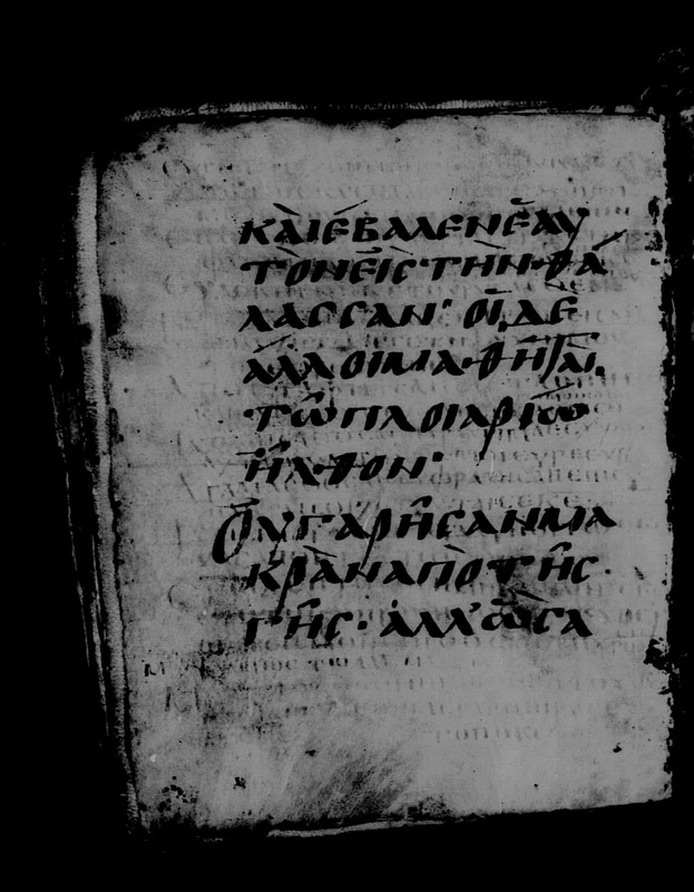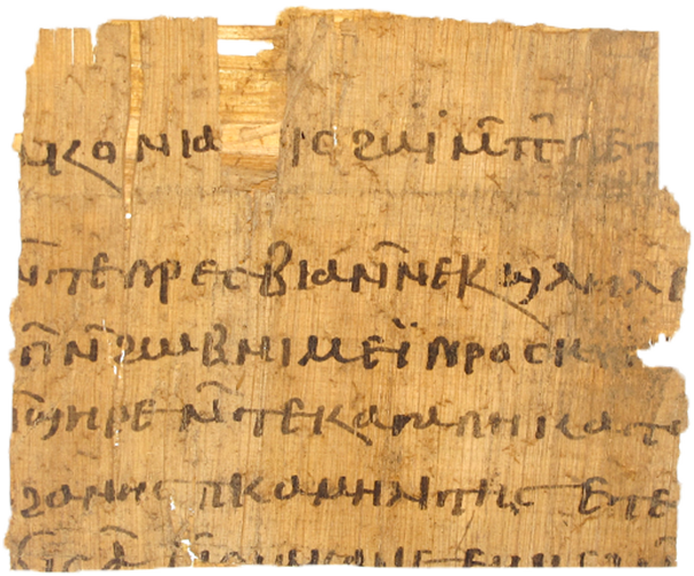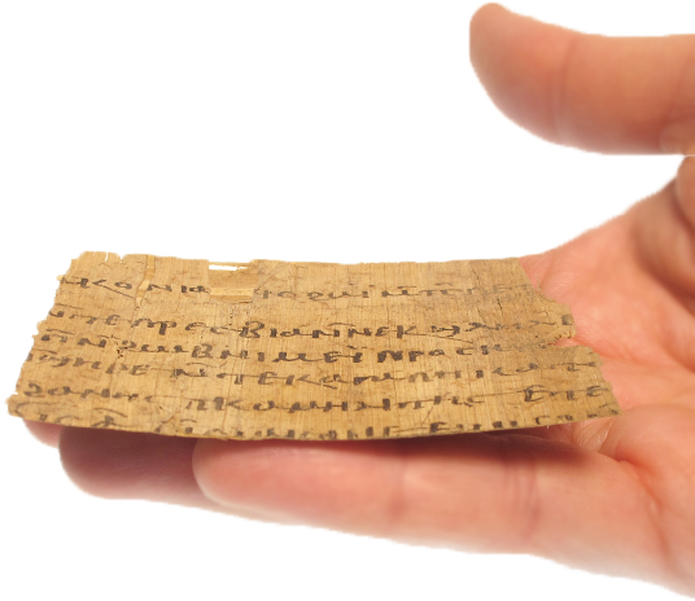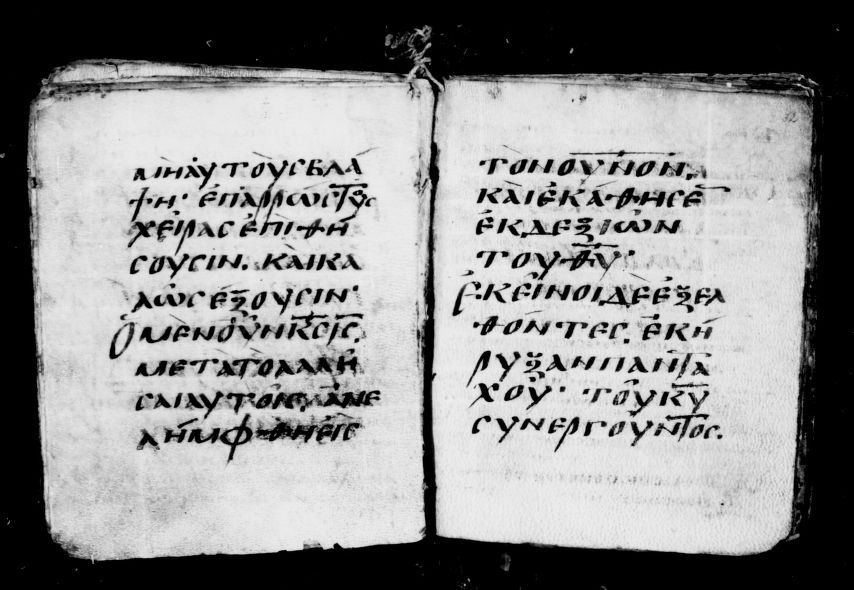|
In my last blog post announcing the digitization of the manuscripts from St. Catherine's monastery, I posted an image of Greek Manuscript 212, or GA Lectionary 846, a ninth century Greek liturgical codex containing the Gospels and the Apostolos, written in a sloping "Slavonic uncial" script. I want to make two observations about this manuscript here and then tell you about an exciting research project. First, it is a very small codex in dimensions: 14.5 (H) x 11.7 (W) cm. As a disclaimer: I do not study Greek manuscripts that are quite this late, but I do know that most lectionaries were intended for public reading, and so the format is somewhat surprising. Perhaps some of my readers will know just how atypical the dimensions are for Greek lectionaries from this period. Second, I noticed that this codex is a palimpsest, meaning that there is an "undertext" that has been wiped/washed away to make space for the "uppertext" which now stands. Scribes typically repurposed majuscule manuscripts for liturgical ones. Take a look at this photo from folio 51, which I have manipulated slightly in order to highlight the palimpsestic features: The 1994 Kurzgefasste Liste indicates that the undertext may be from the Psalms but there is a question mark there (“l 846: untere Schrift Psalmen (?)”). This script of this undertext is obviously older, perhaps dating to the 7th century.
Significantly, as part of the Sinai Palimpsests Project (SPP), the monastery is using spectral imaging to read, identify, and date erased texts found in palimpsests housed at the monastery, of which Greek 212 is one of more than 160 palimpsests. The results of this project will be significant. We await to see the full results of this project, but I have a strong feeling that some of the findings will be significant. Some of the incredible discoveries have already been listed on their website. I will update readers on this exciting project as I learn them!
7 Comments
Artemission, an antiquities company based out of the UK, is selling a little Coptic papyrus fragment on their website for $1,400. The website claims "2nd-3rd century" for the dating of this papyrus, although that is certainly not correct, as it is much later. It would appear to be a private letter, written on the verso, in which a certain "John the camel-driver" makes an appearance in line 5. The terms πρεσβεία ("intercession") and ἀγάπη ("love") also appear. The address is in the first line(s). As for the provenance, the website simply states "ex. Private UK collection, London, UK, acquired in the 1990’s." Artemission is selling another Coptic papyrus on their site, but I think I've included that somewhere on this blog before, or at the very least, I have already seen it. The provenance listed for that one is "ex. property Mr. M. N, London, UK, acquired in the 1990s," which is most probably a reference to Maurice Nahman, a famous antiquities dealer during the early twentieth century. It would be interesting to know just how many papyri were sold from Nahman's estate and where they are precisely.
More than 1,600 ancient manuscripts from the renowned Eastern Orthodox Monastery of St. Catherine’s on Mt. Sinai have been made available online! The images, digitized from older microfilms, are of very good quality. Here is one such image of Greek Manuscript 212, a ninth century Greek lectionary "miniature codex" classified in the Gregory-Aland system as l 846: There is an option to download really high-res files, including TIFF files, but that option was not working for me. Perhaps they will make that available in the near future.
To quote from the catalogue website, the monastery "is home to reputedly the oldest continuously run library in existence today. Its holdings of religious and secular manuscripts are legendary and allegedly second only in number to the collection held by the Vatican: from bibles, to patristic works, to liturgies and prayers books, and on to legal documents such as deeds, court cases, Fatwahs (legal opinions). The greater proportion of the manuscripts were copied in Greek, and then in Syriac, Georgian, Coptic, Armenian, Arabic, Ottoman Turkish, and Ethiopic, as well as Old Church Slavonic." The new site also includes a digitized copy of Kenneth W. Clark's famous Checklist of Manuscripts in St. Catherine’s Monastery, Mount Sinai Microfilmed for the Library of Congress (1950). |
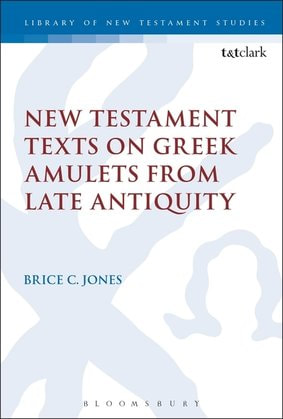
Available at Amazon!
Archives
June 2020
Categories
All
|
